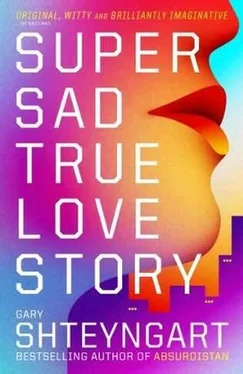“You know I saw Nettie Fine in Rome,” I told him. “At the embassy.”
“And how is our American mama? Does she still think we are ‘cruel’?” He laughed, somewhat cruelly.
“She thinks the people in the parks are going to rise up. The ex-National Guardsmen. There’s going to be a revolution against the Bipartisans.”
“Chush kakaia!” (“What nonsense!”) my father shouted. But then he thought about it for a few moments and spread his arms. “What can be done about someone like her?” he finally said. “Liberalka.”
I felt my father’s breath against my cheek for twenty minutes as he talked about his complex political life, then excused myself, unwound from his humid embrace, and went to the upstairs bathroom, as my mother shouted to me from the kitchen: “Lenny, don’t take your shoes off in upstairs bathroom. Papa has gribok ” (“athlete’s foot”).
In the contaminated bathroom, I admired the strange blob of plastic with wooden spokes that kept my mother’s serious mop-collection in ready-to-access mode. Although my parents never had a good word to say about HolyPetroRussia, the hallways were hung with framed sepia-toned postcards of Red Square and the Kremlin; the snow-dusted equestrian statue of Prince Yuri Dolgorukiy, founder of Moscow (I had learned just a bit of Russian history at my father’s knee); and the gothic Stalin-era skyscraper of prestigious Moscow State University, which neither of my parents had attended, because, to hear them tell it, Jews were not allowed in back then. As for me, I have never been to Russia. I have not had the chance to learn to love it and hate it the way my parents have. I have my own dying empire to contend with, and I do not wish for any other.
My bedroom was nearly empty; all the traces of my habitation, the posters and little bits of crap from my travels, my mother had stowed away in carefully labeled boxes in the closets. I reveled in the smallness, the coziness of an upstairs bedroom in a traditional American Cape Cod house, the half-floor that forces you to duck, to feel small and naïve again, ready for anything, dying for love, your body a chimney filled with odd, black smoke. These square, squat, awkward rooms are like a fifty-square-foot paean to teenage-hood, to ripeness, to the first and last taste of youth. I cannot begin to tell you how much the purchase of this house, of each tiny bedroom, had meant to my family and to me. I still remember the signing at the real-estate lawyer’s office, the three of us beaming at one another, mentally forgiving one another a decade and a half worth of sins, the youthful beatings administered by my father, my mother’s anxieties and manias, my own teenage sullenness, because the janitor and his wife had done something right at last! And it would all be okay now. There was no turning back from this, from the glorious fortune we had been granted in the middle of Long Island, from the carefully clipped bushes by the mailbox (our bushes, ABRAMOVbushes) to the oft-mentioned Californian possibility of an aboveground swimming pool in the back, a possibility that never came true, because of our poor finances, but which could never be decisively put to bed either. And this, my room, whose privacy my parents had never respected, but where I would still find a summer’s hot sanctuary on my glorified army cot, my little teenaged arms doing the only nonmasturbatory thing they were capable of, hoisting aloft a big red volume of Conrad, my soft lips moving along with the dense words, the warped wood-paneled walls absorbing the occasional clicks of my tongue.
Out in the hallway, I caught sight of another framed memento. An essay my father had written in English for the newsletter of the Long Island scientific laboratory where he worked (it had made it onto the paper’s front page, to our family’s pride), and which I, as an undergraduate NYU English major, had helped to proofread and refine.
THE JOYS OF PLAYING BASKETBALL
By BORIS ABRAMOV
Sometimes life is difficult and one wishes to relieve oneself of the pressures and the worries of life. Some people see a shrink, others jump in a cold lake or travel around the world. But I find nothing more joyful than playing basketball. At the Laboratory we have many men (and women!) who like to play basketball. They come from all over the world, from Europe, Latin America, and everywhere else. I cannot say I am the best player, I am not so young anymore, my knees hurt, and I am also pretty short and this is a handicap. But I take the game very seriously and when a big problem comes up in my life and I feel like I do not want to live, I sometimes like to picture myself on the court, trying to throw a ball from a great distance into the hoop or maneuvering against an agile opponent. I try to play in a smart way. As a result, I find that I am often victorious even against a much taller or faster player, from Africa or Brazil, let’s say. But win or lose, what’s important is the spirit of this beautiful game. So if you have time on Tuesday or Thursday at lunchtime (12:30), please join me and your colleagues for a good, healthy time in the physical education center. You’ll feel better about yourself and the worries of life will “melt away”! Boris Abramov is a custodian in the Buildings and Grounds division .
I remember trying to get my father to take out the part about being “pretty short,” and the bit about the pained knees, but he said he wanted to be honest. I told him in America people liked to ignore their weak points and to stress their incredible accomplishments. Now that I think about it, I felt guilty about being born in Queens and having lots of nutritious food on my plate, food that allowed me to grow to a semi-normal height of five feet and nine inches, whereas my father had barely scraped the five-and-a-half-foot mark. It was he, the athlete, not I, the soft and stationary one, who needed those extra inches to sail the basketball past some Brazilian pituitary giant.
The familiar cry of my mother resounded downstairs: “Lyonya, gotovo!” (“Lenny, dinner is ready!”)
Down in the dining room, with the shiny Romanian furniture the Abramovs had imported from their Moscow apartment (the totality of it could be squeezed into one small American room), the table was laid out in the hospitable Russian manner, with everything from four different kinds of piquant salami to a plate of chewy tongue to every little fish that ever inhabited the Baltic Sea, not to mention the sacred dash of black caviar. Eunice sat, Queen Esther-like in her Orthodox getup, at the ceremonial end of the table, upon a fluffed-up Passover pillow, frowning at the attention, unsure how to deal with the strange currents of love and its opposite that circulated in the fish-smelling air. My parents sat down, and my father proposed a seasonal toast in English: “To the Creator, who created America, the land of free, and who give us Rubenstein, who kill Arab, and to love which is blooming in such times between my son and Yooo-neee-kay, who [big wink to Eunice] will be victorious, like Sparta over Athens, and to the summer, which is most conducive season to love, although some may say spring…”
While he went on in his booming voice, a vodka shot glass of some weird garage-sale provenance shaking in his troubled hand, my mother, bored, leaned over to me and said: “ Kstati, u tvoei Eunice ochen’ krasivye zuby. Mozhet byt’ ty zhenishsya? ” (“By the way, your Eunice has very pretty teeth. Maybe you will marry?”)
I could see Eunice’s mind absorbing the basics of my father’s speech (Arabs-bad; Jews-good; Chinese Central Banker-possibly okay; America-always number one in his heart), while gauging the intent on my mother’s face as she spoke to me in Russian. Eunice’s mind moved so quickly through feelings and ideas, but the fear on her face reflected a life rushing by faster than she could make sense of it.
Читать дальше












